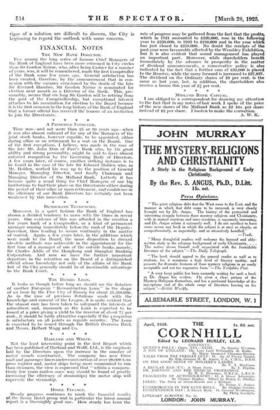FINANCIAL N OTES
Few among the long series of famous Chief Managers of the Bank of England have been more esteemed in City circles than Sir Gordon Nairne, who, after being Cashier for a number of years, was, it will be remembered, made the first Comptroller of the Bank some few years ago. General satisfaction has been created, therefore, by the announcement that in con- nexion with the vacancy occasioned by the death of the late Sir Everard Hambro, Sir Gordon Nairne is nominated for election next month as a Director of the Bank. This, pre- sumably, means that ere long Sir Gordon will be retiring from the post of the Comptrollership, but exceptional interest attaches to his nomination for election to the Board because it is the first occasion in the long history of the Bank of England that a former official has received the honour of an invitation to join the Directorate.
A PRINCIPLE INVOLVED.
Time was—and not more than 25 or 30 years ago—when it was also almost unheard of for any of the Managers of the joint stock banks, however capable, to be appointed, either during office or on retirement to a seat on the Board. One of the first exceptions, I believe, was made in the case of the late Mr. John Dun of Parr's Bank who, by his great ability and strong personality, might be said to have almost enforced recognition by the Governing Body of Directors. A few years later, of course, another striking instance is to be found in the case of the late Sir Edward Holden who, as Mr. Holden, worked his way up to the position of General Manager, Managing Director, and finally Chairman and Managing Director of the Midland Bank. Latterly it has become quite a usual thing for Chief Managers of our big institutions to find their place on the Directorate either during the period of their office or upon retirement, and confidence in the efficiency of our Bank Directors has certainly not been weakened by this innovation.
* * * *
DEMOCRATIC TENDENCIES.
Moreover, in a quiet fashion the Bank of England has shown a decided tendency to move with the times in recent years. One evidence of this was afforded in the creation a few years back of a Comptroller, or a kind of permanent manager coming immediately below the rank of the Deputy- Governor, thus tending to secure continuity in the matter of control. Again, a few years later, in the additions which were made to the Board, the some disposition to discard obsolete methods was noticeable in the appointment for the first time of a manager of one of the outside banks, namely, Sir Charles Addis of the Hongkong and Shanghai Banking Corporation. And now we have the further important departure in the retention on the Board of a distinguished official whose knowledge not only of the affairs of the Bank but of the City generally should be of inestimable advantage to the Bank Court.
* * * *
THE DANZIG LOAN.
It looks as though before long we should see the flotation of another European " Reconstruction Loan " in the shape of an issue by the Free City of Danzig for about £1,500,000. As in the case of previous flotations made with the knowledge and consent of the League, it is quite evident that the utmost care has been taken to safeguard the interests of subscribers and, inasmuch as the Loan is expected to be issued at a price giving a yield to the investor of about 7 per cent., it should be fairly attractive especially if the prospectus is satisfactory on all points as regards security. The Loan is expected to be issued through the British Overseas Bank and Messrs. Helbert Wagg and Co.
•
HARLAND AND WOLFF.
Not the least interesting point in the first Report which has been published of Harland and Wolff, Ltd., is the emphasis laid by the Directors upon the increase in the number of motor vessels constructed. The company has now three mail and passenger liners under construction of over 20.000 tons gross register and, motor ships being more economical to run than steamers, the view is expressed that " within a compara- tively few years (unless sonik-i way should be found of greatly increasing the efficiency of steamships) the motor ship will supersede the steamship.
* * * *
HOTEL FINANCE.
Steady progress continues to mark the financial results ot_the Savoy Hotel group and in particular the latest annual - report Is a tboronghly good one. How steady has been the
rate of progress may be gathered from the fact that the profits, which in 1921 amounted to £220,000, rose in the following year to £230,000, in 1923 to £240,000 and in the year which has just closed to £258,000. No doubt the receipts of the past year were favourably affected by the Wembley Exhibition, but it is also evident that sound management has played an important part. Moreover, while shareholders benefit immediately by the advance in prosperity in the matter of dividend announcements, a conservative policy is also indicated by the fact that a further sum of £50,000 is placed to the Reserve, while the carry forward is increased to £37,837. The dividend on the Ordinary shares of 10 per cent. is the same as last year, but, in addition, the shareholders also receive a bonus this year of 2f per cent.
* * * *
MIDLAND BANK CAPITAL.
I am obliged to a correspondent for drawing my attention to the fact that in my notes of last week I spoke of the price of the new shares of the Midland Bank as £2 lOs. per share instead of £2 per share. I hasten to make the correction.
A. W. K.














































 Previous page
Previous page